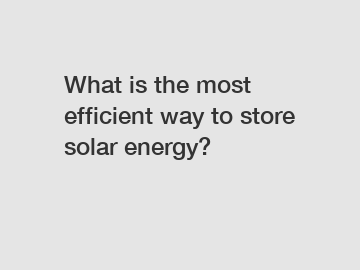Feb. 22, 2024
Energy
Link to Energyland
Solar energy is becoming an increasingly popular source of renewable energy as we strive to reduce our reliance on fossil fuels and combat climate change. While solar panels are great at capturing the sun's energy and converting it into electricity, one of the major challenges with solar power is its intermittency - the sun isn't always shining, which means we need a way to store excess energy for use when the sun isn't shining.
So, what is the most efficient way to store solar energy? There are a few different methods that can be used, each with its own set of advantages and disadvantages. Let's take a look at some of the most common ways to store solar energy and explore which method might be the most efficient.

1. Battery storage.
Batteries are one of the most common ways to store solar energy. When the sun is shining and your solar panels are producing more electricity than you need, the excess energy can be stored in a battery for use at a later time. Batteries are efficient at storing energy and can be used to power your home during the night or on cloudy days when your solar panels aren't producing as much electricity.
There are a few different types of batteries that can be used for solar energy storage, including lead-acid batteries, lithium-ion batteries, and flow batteries. Lithium-ion batteries are becoming increasingly popular for solar energy storage due to their high energy density, long lifespan, and fast charging capabilities.
2. Thermal storage.
Another way to store solar energy is through thermal storage. With thermal storage, excess solar energy is used to heat a substance such as molten salt or water, which can then be stored and used to generate electricity when needed. Thermal storage is particularly useful for solar thermal power plants, where large amounts of energy can be stored and used to generate electricity on demand.
One of the advantages of thermal storage is that it can be more cost-effective than battery storage for large-scale energy storage. Thermal storage systems can also be more efficient than batteries at storing and releasing large amounts of energy over an extended period of time.
3. Pumped hydro storage.
Pumped hydro storage is another efficient way to store solar energy. With pumped hydro storage, excess energy from solar panels is used to pump water from a lower reservoir to a higher reservoir. When energy is needed, the water is released from the higher reservoir and flows back down to the lower reservoir through a turbine, generating electricity in the process.
Pumped hydro storage is one of the oldest forms of energy storage and is commonly used to store excess electricity from the grid. While pumped hydro storage can be efficient and cost-effective for large-scale energy storage, it does require suitable topography and water resources, which may limit its applicability in some regions.
4. Compressed air energy storage.
Compressed air energy storage is another way to store solar energy. With compressed air energy storage, excess energy from solar panels is used to compress air and store it in an underground cavern or tank. When energy is needed, the compressed air is released and expanded through a turbine, generating electricity in the process.
Compressed air energy storage can be a cost-effective and efficient way to store large amounts of energy for extended periods of time. While compressed air energy storage does require suitable underground storage facilities, it can be a viable option for regions with the right geology and infrastructure.
In conclusion, there are several efficient ways to store solar energy, each with its own set of advantages and disadvantages. Battery storage is a popular choice for residential solar energy systems, while thermal storage, pumped hydro storage, and compressed air energy storage can be more suitable for large-scale energy storage. Ultimately, the most efficient way to store solar energy will depend on factors such as the scale of the energy storage system, available resources, and cost considerations. As we continue to develop and improve energy storage technologies, we can look forward to more efficient and sustainable ways to store and utilize solar energy in the future.
Click here to get more.
If you are looking for more details, kindly visit lithium battery manufacturer.
If you are interested in sending in a Guest Blogger Submission,welcome to write for us!
All Comments ( 0 )